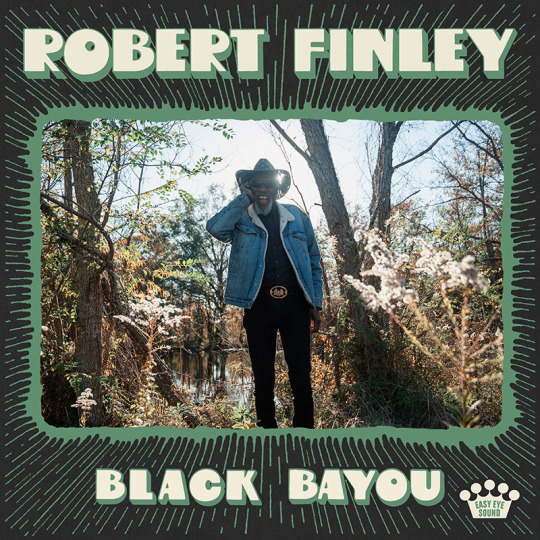#laquindrelyn mcmahon
Text
Robert Finley Interview: Something to Laugh About

BY JORDAN MAINZER
The most stunning and heartbreaking song on blues singer Robert Finley's latest album Black Bayou (Easy Eye Sound), is made up. On album closer "Alligator Bait", the narrator--at first talking rather than singing--describes trudging through the swamp, his grandfather having just purchased for him a pair of hip boots. Backed by Kenny Brown's spindly guitars, Eric Deaton's slinky bass, and Jeffrey Clemens' slow-burning, stomping drums, Finley's gruff voice tells the story of this character wading around, waiting for something to happen. He accidentally steps on an alligator's back, thinking it's a log; his grandfather shoots the gator after it reacts. Matter-of-fact, Finley states, darkly humorous, "A lotta kids got ate like that." But on the second half of the song, he sings, wailing like a bluesman who had his heart broken. Only this time, he's taken aback by familial betrayal, realizing his grandfather had only bought him the hip boots and told him to enter the swamp in order to use him as alligator bait. When the narrator goes home to tell his father, his father laughs and brushes him aside, confessing that the same thing happened to him when he was a kid. Most of us face a mini existential crisis when we learn our parents aren't perfect. The narrator of "Alligator Bait", on the other hand, has just learned of his own dispensability.
When I spoke to Finley over the phone a few days before Black Bayou was released in late October, he confessed, "'Alligator Bait' was supposed to be cheerful. I didn't want to make him look like a mean old grandpa. It's just something to laugh about," before pausing and adding, "Maybe it'll make some kids stay away from the creek." Indeed, seven years into his improbable comeback, Finley views his role as a singer and entertainer as twofold: meeting the audience at the heart while simultaneously giving them advice, telling them the barebones truth when other authority figures won't. On Black Bayou, he reckons with ideas of homesickness and loneliness, lust and love, selflessness and salvation. Buoyed by longtime collaborator Dan Auerbach of The Black Keys, Finley wrote all of the songs in the studio, and his familiarity with his supporting cast of musicians resulted in songs that were both efficiently recorded and emotionally acute. Brown's guitar winces with longing on "Livin' Out A Suitcase" as Finley's tired of traveling. On "Waste Of Time", a song that sees Finley taking pride in rural living even if it means missing out on opportunities provided by cities, the buzz-saw guitars and Clemens' clattering percussion yield a perfect maximalism to go along with Finley's claims that, yes, there's still a lot to digest right outside your doorstep. "There are so many guys down here with super talent," Finely said. "They haven't been exposed to the right places."
In fact, Finley's daughter and grandaughter, Christy Johnson and LaQuindrelyn McMahon, offer a prototype. Like many musicians and singers in rural Louisiana, Johnson had long been singing at church, specifically in the youth choir before she started traveling with her father, joining him on his 2019 America's Got Talent stint and eventually recording background vocals on 2021's autobiographical Sharecropper's Son. And Finley insisted to Auerbach on McMahon singing backup on Black Bayou, though she's also in her own band, according to Finley. After all, there's not much of a difference between blues and gospel music. As Finley puts it, it's just "Oh, baby!" versus "Oh, lord!"

Really, Finley feels his songs could essentially soundtrack various milestones or important events in life. He made sweet doo wop outlier "Lucky Day" for others. "It's a wedding song. It's for people celebrating their 50th anniversary," he said. "It's one of those songs you can use in different situations." In contrast, he describes "Susie Q"-esque lurker "What Goes Around Comes Around" as "basically scripture," even as he sings lines like, "I got my whiskey and my woman / I ain't worried about a thing." Living the way you want and keeping to yourself can be a holy exercise, too. "They're the true facts. No sugarcoating," Finley said, adding, "Something the preacher ain't gonna say. They'd kick him out the church!"
The line between Finley's performance as authentic versus an act is not one he's really ultimately concerned with, as the very fact that he's gotten here is surreal. "I'm living my childhood dream at my age," he said. "I get a chance to express myself. To be able to go back and look at myself on film to see how I've made a fool of myself." Multiple times throughout our conversation, he referred to himself as in total service of the audience, wanting to make them laugh, wanting to make their lives easier, even if he needs to paint himself as a sinner or dunce in order to do so. Still, he has his head on his shoulders. "There's a difference between acting a fool and being a fool," Finley said. "One means you're a really good actor because you can act crazy, and the other says, 'You're fucking crazy for real.'" Find me a preacher who'd admit that!
youtube
#interviews#robert finley#black bayou#easy eye sound#kenny brown#eric deaton#jeffrey clemens#dan auerbach#the black keys#christy johnson#laquindrelyn mcmahon#america's got talent#sharecropper's son
0 notes